What Just Happened?
I glance back at a recent event and relay some thoughts.
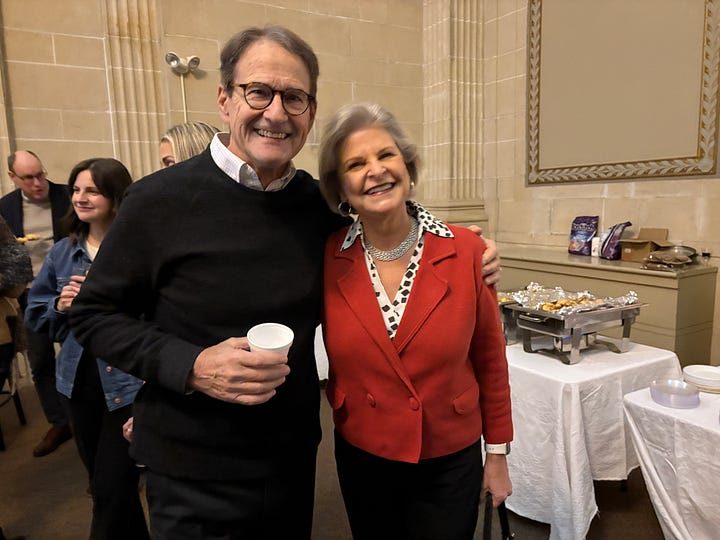
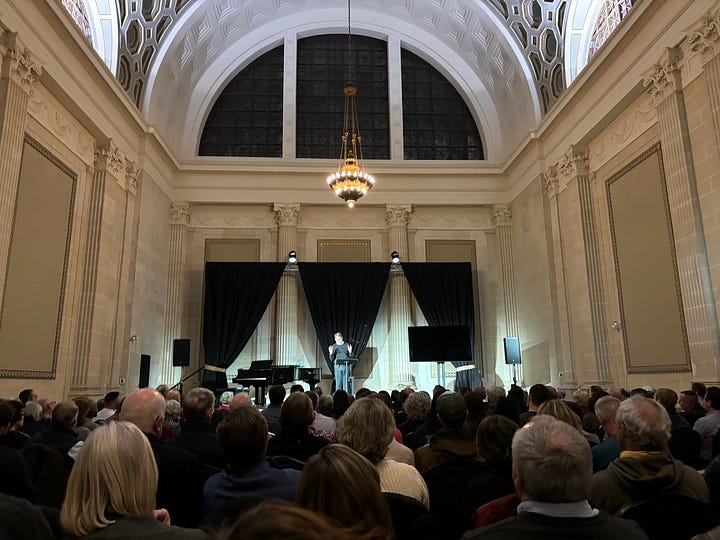
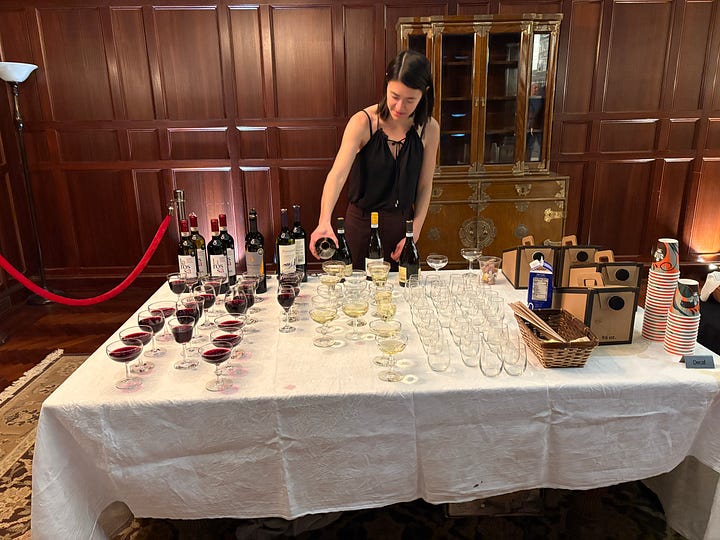
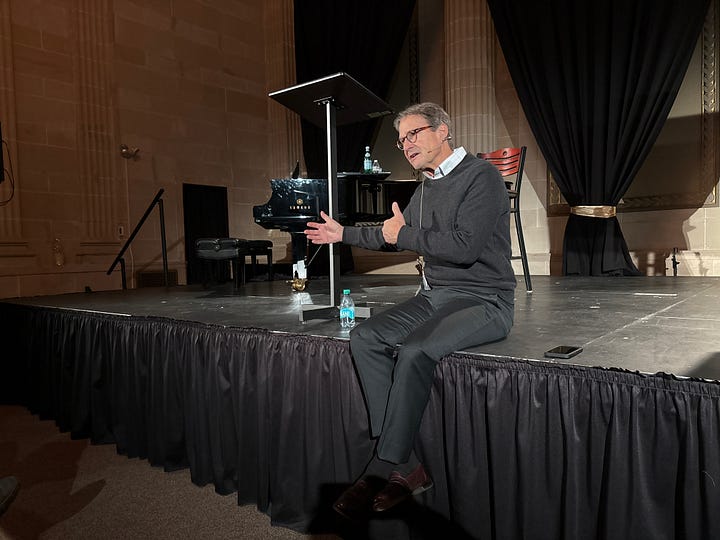
On Jan. 10th over 150 people came in from the cold (literally, perhaps metaphorically) to hear Don Eberly at our inaugural Forum of 2025.
Thanks to my hospitality team we enjoyed a gala atmosphere under the vaulted ceiling of The Trust Performing Arts Center. Great job, Samuel, Becky, Kimberly, Carter, Luke, Emily, Laura, and Kelsey!
But little performing took place. Instead we heard a wise and modest presentation on the infectious strains of our society that have led us to symptoms like fear, suspicion, vitriol, carelessness, envy, and vanity.
Unlike the “America is going to hell in a hand basket” screeds from the Left and the Right in the recent election cycle, Don’s tack was more hopeful, and he left us with a few vivid images and actionable ideas for loving our neighbors in 2025.
Eberly has been working at the federal level as a Christian humanist (let the reader understand) for over four decades. You can hear in his voice an earnestness for kindness in our times.
He’s convinced that a civil veneer isn’t enough to save America. It isn’t even enough to make any one of us better humans.
What’s needed is a revolution of grace.
First, within each of us as we surrender to Christ’s love for us.
Second, in redirecting that grace outwardly toward our fellow image bearers, whether we agree with them, like them much, or share history with them.
I won’t recount or dissect his points here. If you want a full manuscript I can send you one, or you can take up your questions with him. He’s easy to find online.
I was glad to see a lot of new faces come through the door along with some Row House vets who brought friends. If you were one of them, thanks for coming!
The day after our event Don and Sheryl sent me individual emails thanking us for hosting them. They were surprised by the attendance and the participation of the audience.
I wasn’t.
For one thing, we’ve been at these public theology and hospitality experiments for fifteen years, and we’ve gained a reputation as a venue for substantial yet enjoyable dialogue.
For another, Don Eberly’s name and reputation go before him. The Eberlys are Lancaster County treasures, and I’m grateful that we caught Don as he’s emerging into more speaking and writing.
And one more thing: We live in a time that easily amplifies resentment, suspicion, and downright hatred. As a Christian I’m very much aware of my own heart’s draw to such a fearful disposition.
Kindness, the kind that sends rain and sun abundantly upon all of humanity, is what I desire to learn. Let’s roll up our sleeves and learn together.
Tomsées
In which I share a short take on Christ and culture.*
A Book That Read Me
I’ll blame Byron Borger.
Book seller extraordinaire, he pushed The Overlooked Americans into my hands as I was trying to make an inexpensive exit from his store, Hearts & Minds in Dallastown.
Dang. Snagged me again!
I was glad he did.
Have you ever felt that a book was reading you? That was my experience as I powered through Elizabeth Currid-Halkett’s copious sociological research on the urban/rural divide in America.
Her sub-title is bursting with meaning: The Resilience of our Rural Towns and What it Means for Our Country.
It was more than her data that spoke to me, though. Seasoned throughout her 432 page analysis were samplings from hundreds of interviews she conducted with real rural Americans.
On one level she really did have to take the time, sometimes uncomfortably, to go “granular” with middle-Americans. As a self-described LA-based liberal, it was arduous for her to notate many beliefs she finds repulsive such as evangelical faith expressions, pro-Trump sound bites, and traditional sexual convictions.
On another level, she knows these people intuitively. Like me, she grew up in rural Pennsylvania, ten miles, in fact, from my hometown.
Danville, PA for her is not foreign territory. It’s home. Though her parents were educated professionals, she rubbed shoulders with the same sorts of Curts and Barbies I ran with in Watsontown.
Each of us went to four year college and graduate school. I could completely relate to her desire to “leave Dodge” on the heels of my intellectual renaissance. To be through with the small-mindedness of my provincial nursery.
But it’s impressive that she took the time to see the dignity of people from smaller places rather than dismiss them as a “basket of deplorables.”
What she found is that rural and urban folk share a vast amount of common ground on everything from gun rights, abortion, and family values.
This isn’t what most media outlets try to convince us of. With them, our divisions drive better watch rates.
Rather than continuing to insist that the vast majority of Americans are hyper-poloraized, we might try to better understand, to take that Tocquevillian tour of American to see what is actually going on, which is what I have tried to do in this book. What I found was a small-town America that is just as complicated and diverse as urban America. A place filled with goodness, generosity of spirit, tolerance, and care for others. These were people who became my friends.1
Her surprise in writing this book was not so much that an elite meritocracy takes upward mobility from those of a lower socioeconomic strata, but that those outside the meritocracy don’t really care all that much anyway. The latter group may be overlooked by the Ivies and elite professionals, but overall they have a grateful, affirming, and meaningful outlook on life.
You’ve got a house, your kids live nearby, you see them and your grandchildren almost daily, food is reasonably priced, you don’t pay for private school, your kids don’t attend $70,000 per year private universities, and everyone is doing alright. How much can you really care that you’re not a member of an elite class? No one I spoke to felt left out or left behind.2
She does, additionally, voice the concern that there are a lot of kids, mostly in rural areas but also in poor urban ones, that simply can’t ascend upward mobility for the simple reason that too few people in their context value such improvement.
No one in my immediate family mantled me with an expectation of higher education. I took no college-prep courses. I “majored” in art and shop.
My speech teacher, herself an outspoken Christian, saw some talent in me, and my art teacher Mr. Troutman put artistic aspirations in me. I was on my way to community college for electronics when Mr. Baumer, a WWII vet with stubbed fingers to prove it, encouraged me to apply to Bloomsburg State College.
Somehow I got in. That, along with a six week arts exposure in the PA Governor’s School for the Arts, put me on a path to creative ministry in Academia, theological graduate school, and what you see now: The Row House, Inc.
Without those three key mentors I also would not have gone to university. Not that I’m swing-dancing in elitist circles these days. Part of me is allergic to the notion, but I’ve certainly gained access to much larger institutions than The Watsontown Model Railroading Club (nothing wrong with that, mind you).
I hope to sit down with Ms. Currid-Halkett someday in Lancaster (or better yet in Danville) to thank her for not overlooking my people, our people, and many of the people I see daily in Lancaster.
I will also try to understand how it is that in all of her experience and research she seems to have overlooked one big segment of America to which I owe my very self: Educated Christians. That is, I get the feeling she’s not spent much time in the presence of faith-fused thinkers or in the fellowship of the many folks involved in, say, campus ministry on most of our secular campuses. Throw in the many thoughtful, nuanced, permeable Christians in secular and religious institutions.
Perhaps her story is less about overlooking the great intellectual tradition of belief and more about herself being overlooked by believers.
She went out of her way to understand others and received, in turn, a listening ear from non-elitists, many of them Christians. This, it seems to me, is a clarion call to those of us who claim to be on the side of truth to take the time to build bridges with those who don’t share our faith.
To make friends across the divide we partially created.
*Tomsées is a nod to Pensées, an eclectic collection of writings by Blaise Pascal which were a work of apologetics for the Christian faith, published posthumously in 1670.
Let’s Talk About the Future
The 4-1-1 on What’s Coming Down the Pike at The Row House, Inc.
Surely We Jest Not
We’re excited to welcome back Bruce Etter to speak on the novel that seemed outrageous at the time but has turned out to be strangely prescient about our times. No need to read David Foster Wallace’s 1,000 page tome unless you’re snowed in and can handle it. It’s crude in places and full of craziness. Bruce has done the dirty work for us and will give us an overview of its story, such as it is, to make it land squarely in 2025. Which it does adroitly. DFW’s warning about a consumerism age ought to be enough to get our attention. And to get us to read it.
Well, that’s about all for now. Please stay in touch, and don’t forget to ❤️ this column on Substack, make a comment, or reach out to me with anything on your mind. See you soon!
Cheers in the New Year,
Tom Becker, Founder & Curator of The Row House Forum
Page 224
Page 316




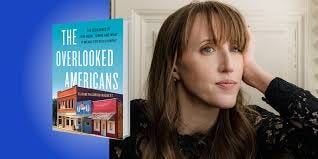
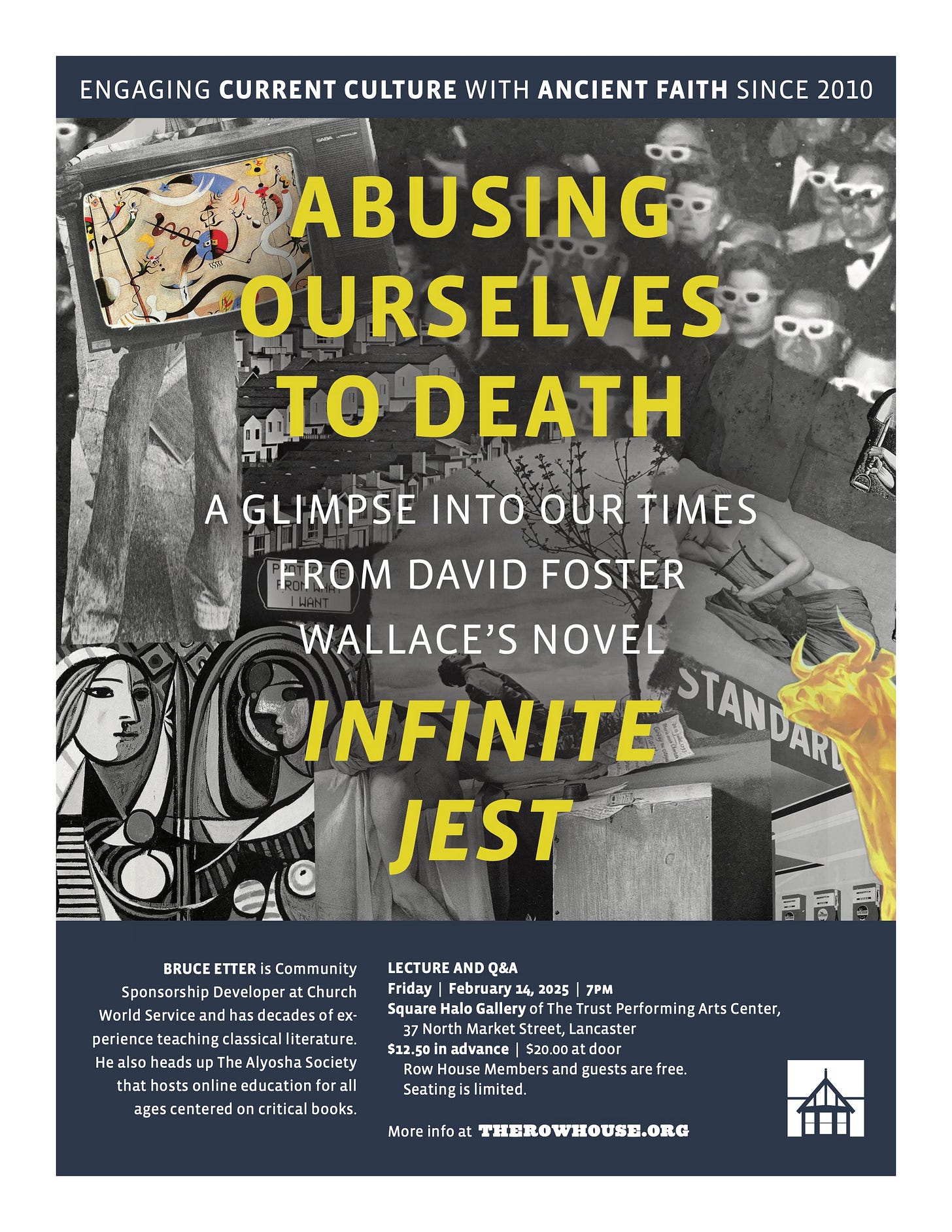
That was an encouraging talk; I wish I was closer and could attend!